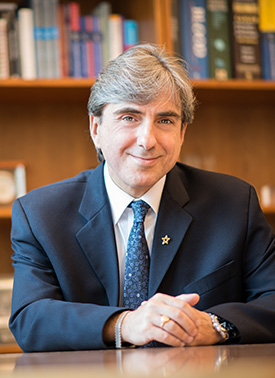July 1, 2016:
A conversation with Leonidas Platanias, MD, PhD, Director of the Robert H. Lurie Comprehensive Cancer Center of Northwestern University, which is a member of the Big Ten Cancer Research Consortium.
Q: How do you think cancer research will change in the next 10 to 20 years?
This is an exciting time in oncology, and we see tremendous opportunities to advance cancer prevention, diagnostics and therapeutics in ways that were unimaginable just a few years ago. Immunotherapy and genomics, two of the most compelling areas of research today, will provide unprecedented opportunities to control – and in some cases cure – treatment-resistant cancers.
The Lurie Cancer Center OncoSET (Sequence, Evaluate, Treat) Program, launched in 2015, combines genomic sequencing and molecular diagnostics to identify new, individually tailored treatments and clinical trials. We recently initiated the Lurie Cancer Center OncoSET Clinic, under the leadership of Massimo Cristofanilli, MD, Associate Director for Precision Medicine and Translational Research. The OncoSET Molecular Tumor Board, a multidisciplinary group of physicians and scientists, reviews the results and recommends a personalized treatment plan. To the best of my knowledge, this is the first site-agnostic, molecular pathway-driven clinic in Chicago.
Q: What does translational science look like within your institution and in your collaboration with other Big Ten CRC member institutions?

Collaboration and incentives are critical to accelerating the translation of basic science research into clinical advancements. The Translational Bridge Program is one example of how the Lurie Cancer Center is fostering collaboration to heighten the impact of translational research by providing funds for Postdoctoral Fellows to conduct research in an area of fundamental importance to cancer biology, with future potential for translation into a diagnostic or therapeutic setting.
Lurie Cancer Center Bridge Fellows carry out their projects in a basic science lab headed by a seasoned investigator, and partnered with a clinician with expertise in a particular cancer or clinical research field. The Bridge Fellow is mentored by both of these faculty members, serving as a bridge to exceptional translational research.
We’re excited about this approach to training a new generation of investigators, and the focus on translational research projects being funded by this program. Our participation in the Big Ten Cancer Research Consortium provides additional opportunities, particularly for our more junior faculty members, to develop investigator-initiated clinical trials within an established consortium and to collaborate with and mentor tomorrow’s research leaders.
Furthermore, it allows us to bring promising projects to our patients by prioritizing our portfolio of clinical trials.
Q: In what ways is your institution involved in expanding access to clinical trials throughout the communities you serve?
The growth of Northwestern Medicine over the past year is helping the Lurie Cancer Center expand access to clinical trials to patients across eight Illinois counties. We’re focused on finding new ways to provide cancer patients throughout the region with more streamlined access to novel clinical trials and therapies.

A five-year grant from the NCI is supporting the creation of the Chicago Cancer Health Equity Collaborative (ChicagoCHEC), and helping Northwestern, the University of Illinois at Chicago (UIC) and Northeastern Illinois University work together with many of the city’s underserved communities to reduce cancer disparities and improve health.
Q: How is the Big Ten CRC unique from other research consortia in which you participate?
The Big Ten Cancer Research Consortium’s (Big Ten CRC) emphasis on fostering translational research and supporting collaboration helps to streamline our efforts, and enables the other member institutions to benefit from our individual strengths and resources. It also provides unique opportunities for philanthropy to support the clinical trials in the network. Participation in the consortium helps us all work together to mentor and develop the efforts of our junior faculty, and maximize the impact of our collective expertise.
About the Big Ten Cancer Research Consortium: The Big Ten Cancer Research Consortium was created in 2013 to transform the conduct of cancer research through collaborative, hypothesis-driven, highly translational oncology trials that leverage the scientific and clinical expertise of Big Ten universities. The goal of the Big Ten Cancer Research Consortium is to create a unique team-research culture to drive science rapidly from ideas to new approaches to cancer treatment. Within this innovative environment, today’s research leaders collaborate with and mentor the research leaders of tomorrow with the unified goal of improving the lives of all patients with cancer.
About the Big Ten Conference: The Big Ten Conference is an association of world-class universities whose member institutions share a common mission of research, graduate, professional and undergraduate teaching and public service. Founded in 1896, the Big Ten has sustained a comprehensive set of shared practices and policies that enforce the priority of academics in the lives of students competing in intercollegiate athletics and emphasize the values of integrity, fairness and competitiveness. The broad-based programs of the 14 Big Ten institutions will provide over $200 million in direct financial support to almost 9,500 students for more than 11,000 participation opportunities on 350 teams in 42 different sports. The Big Ten sponsors 28 official conference sports, 14 for men and 14 for women, including the addition of men’s ice hockey and men’s and women’s lacrosse since 2013. For more information, visit www.bigten.org.

















Subscribe to the Big Ten CRC Newsletter X
X Facebook
Facebook YouTube
YouTube